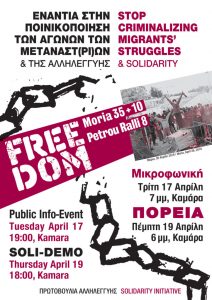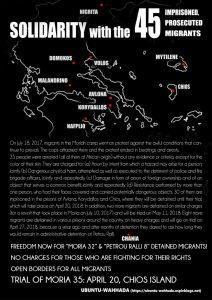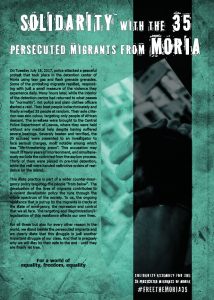In the coming weeks there will be 3 trials of migrants protesting inhuman condition in camps and detention centers in Greece (53 migrants in total). Also, a trial against solidarity activists.
We document a solidarity text written by the Balkanroute Network Meeting in Zagreb in March 2018.
Balkanroute Network Solidarity text –
Greece: “borders within borders” and long-term detention
 The camps in Greek islands are officially militarized and operate under “prison” rules, always with the cooperation of police, army, judicial authorities and NGOs. In this way, better management of the immigrant population is achieved: strict control of the detained, as well as disciplining those who are “free” (though trapped in the Greek territory) under the threat of imprisonment. In mainland Greece, a basic pillar of migrant management is the concept of administrative detention, a totally vague framework of detention, in which the prisoner does not even know how long (s)he will be detained. So (s)he wakes up every morning hoping that (s)he will be freed, and sleeps every night with the burden of another day in the cage. When detained migrants dare to make even the smallest protest, for example asking for information about the reason and the length of their detention, the State’s response is relentless but organized and deliberate. This is evidenced both by the fabricated charges against the “Petrou Ralli 8” and by the almost simultaneous arrest of the 35 migrants in the camp of Moria, charged for similar felonies, after facing the same repression: fierce beating and random arrests, in short subjects of the same central political decision.
The camps in Greek islands are officially militarized and operate under “prison” rules, always with the cooperation of police, army, judicial authorities and NGOs. In this way, better management of the immigrant population is achieved: strict control of the detained, as well as disciplining those who are “free” (though trapped in the Greek territory) under the threat of imprisonment. In mainland Greece, a basic pillar of migrant management is the concept of administrative detention, a totally vague framework of detention, in which the prisoner does not even know how long (s)he will be detained. So (s)he wakes up every morning hoping that (s)he will be freed, and sleeps every night with the burden of another day in the cage. When detained migrants dare to make even the smallest protest, for example asking for information about the reason and the length of their detention, the State’s response is relentless but organized and deliberate. This is evidenced both by the fabricated charges against the “Petrou Ralli 8” and by the almost simultaneous arrest of the 35 migrants in the camp of Moria, charged for similar felonies, after facing the same repression: fierce beating and random arrests, in short subjects of the same central political decision.
The Petrou Ralli 8
On May 31, 2017, at the Attica Aliens Police Directorate, the infamous Petrou Ralli pre-removal detention centre, 8 immigrants were arrested after they were attacked by police inside their very cells. The reason for the police attack was that detained migrants were asking to contact the head of the detention centre, in order to be informed for how long they would be held there, as they had already been 8 to 10 months in detention. Police response to this simple request was to heavily beat them. As a result, the eight were transferred to hospital with heavy injuries on their heads and broken hands. Police, in order to cover up the beating, immediately filed a case against them. According to the fabricated evidence, the migrants attacked police officers with “improvised razor blades and phone cards” and there has been an “escalation of tension” for “forty minutes”. It is even supposed that during this time, the prisoners tried to escape by hitting themselves on the central door of their cellblock, in order to break it, and that, supposedly, in their attempt to “flee”, they slipped and got injured on their own. Immigrants for their part argue that the cops invaded the cells unprovoked and started beating anyone they found in front of them. The Petrou Ralli 8 migrants are imprisoned in 6 different prisons, all over the country: Volos, Nigrita Serres, Domokos, Malandrino, Nafplio, and Chania. Their trial will take place on April 27, 2018, in Athens.

Moria Unaccompanied Minors’ Section – November 20, 2017 Revolt
At the southern entrance of the hot spot at Moria is the section of unaccompanied minors with a capacity of about 200 youngsters. In this, under the supervision of cops and NGOs, about 300 children are awaiting their transfer to some hostels in the city of Mytilene or in mainland Greece. However, due to insufficient capacity, many minors are forced to sleep outside the section, which poses serious issues for their safety. Questions also arise regarding the methods of recognizing the “childhood” of many children, with arbitrary methods of age verification used (e.g. dental examinations), which eventually exclude a large proportion of them who are registered as adults. Following the April 2016 protests and riots in Moria, minors from this “secured” section have ensured that they can come in and out from it by using an identification card. However, their entrapment on the island, and the accumulated pressure they feel often leads to reactions. The culmination of these reactions was the small revolt that took place at dawn on Monday 20th November 2017. About 300 minors, during a three-hour period, attacked and broke down whatever reminded them of the condition of devaluation that they are experiencing. The cops arrested 7 of them with charges of arson, disruption of common peace, provocation of pronounced damage, attempted bodily harm, and resistance. Seven of the minors went through a prosecutor and faced restrictive conditions. At the same time, however, a special penitentiary regime operates within the wing by the administration of the center. Minors who have “created problems” within the ward are expelled from the director of Moria’s detention center and are forced to stay in the hot spot among adults. For the housing of unaccompanied minors, but also for minors under 13, a new safe zone has been created since the end of November 2017 on the northern side of the center but has not yet been put into operation.
Moria 35+2
 On Tuesday, July 18 2017, protesting migrants left the Moria camp to block the main street outside. While shouting slogans outside the camp, polices forces from inside as well as outside the detention centre attacked them with stones, teargas and stun grenades.
On Tuesday, July 18 2017, protesting migrants left the Moria camp to block the main street outside. While shouting slogans outside the camp, polices forces from inside as well as outside the detention centre attacked them with stones, teargas and stun grenades.
The migrants responded by throwing rocks back at the police and starting small fires. After the conflict, the interior of the detention centre had returned to “normality”, yet police forces started a purge inside Moria. The migrants had to face the menace of the riot police, who stormed house-containers, beating anyone indiscriminately until finally arresting 35 people at random. Their sole criterion was skin colour, since they were targeting people of African descent.
Two more people were arrested in August and a new case file was drawn up for the July 10, 2017, riots in Moria . Their trial will take place on May 11 2018.
In January 2018, preliminary investigation for the Moria 35 was completed. Thirty of the persecuted immigrants continue to be jailed in four different prisons in the country (Korydallos, Avlona, Chios, Malandrino), with their custody being extended for another 6 months after a new decision by the judicial council of Mytilene.
The 35 accused are facing serious charges, many years of imprisonment and exclusion from the asylum process. More specifically, they are charged for:
1. Arson by intent from which a hazard may arise for a person, jointly.
2. Dangerous physical harm, attempted as well as executed to the detriment of police and fire brigade officers, jointly and repeatedly.
3. Damage in form of arson of foreign ownership and of an object that serves a common benefit, jointly and repeatedly.
4. Resistance performed by more than one person, who had their faces covered and carried potentially dangerous objects.
The trial of Moria 35 will take place on April 20 on Chios island.
Finally, solidarity is also criminalized, as 3 members of the former No Lager assembly will go on trial on April 23, 2018, in Drama, Greece, accused of “provoking a felony” because of their participation in solidarity visits to the detention center of Paranesti in the Spring of 2015, during a hunger strike of migrants detained there. The 3 (Greek) activists are not facing heavy charges, as the Moria and Petrou Ralli migrants do, but the criminalization of solidarity is quite serious by itself.
End detention regime!
Open the islands!
Trial of the Moria 35: April 20, Chios island.
Trial of No Lager 3: April 23, Courthouse of Drama
Trial of Petrou Ralli 8: April 27, Athens
Trial for the July 10 (2017) riots in Moria: May 11, 2018.
A transnational solidarity week has been called: Saturday April 14 to Friday April 20
